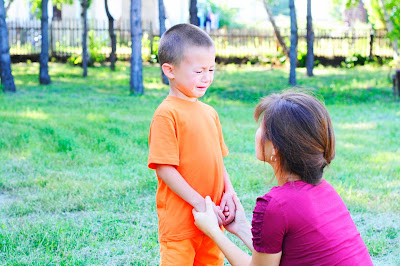
Traditionally, use of force is considered as the main tool
to discipline the children, as it is easy for the parents, however, if you want
to persuade the children or disagree with the traditional approach, you can try
the new techniques that may seem hard to you, however, the long-term benefits
will be rewarding than any approach. For instance, if it is about the power wheel, you can try to discuss with the children why cannot you take them out
right away. However, if force is used on children, it can severely distort
their perspective. For instance, the child will accept the use of force and may
become violent when he/she grows up. Therefore, it is important to learn the
new methods which are more successful and denounces force.
According to the experts, if you want to maintain a good
level of relationship with children, it is best to have more than five types of
positive interaction with them in addition to reducing the negative energy.
Similarly, if you can spend quality time with children and make them value your
relationship over materialistic things, you can strengthen the bond for life.
However, it does not mean that your child will always behave or respond to the
love and care you give them. Hence, you may have to work on a plan that can
make the process of regulating the behavior of the children easy. Moreover, it
has been noticed that if you use force to discipline the children, they can
develop an understanding driven by an unfair idea and a sense of punishment can
get deeply engrained in their head.
From Anger to Empathy

The first step is to ensure that your child trusts you and
that you will be able to give them support in a hard time. If you have mistrust
or communication gap, you may not be able to convert your anger into empathy.
This is why it is important to work on the bond with your child. For example,
if you take the time to think or calm down, it can help to become empathetic.
Conversation Starter

It has been observed that child of all age brackets responds
positively if you take steps to show warmth or affection to them. Therefore,
the key is to be open with them in terms of talking and discussing your
concern, the idea is to get the awkwardness of talking to your child out of the
way so that you can talk about relationship building techniques. For instance,
if you eat one meal together, you can ask the child about his/her day. And if
the child tells you something you do not like, try to listen and understand
rather than reacting.
Give Importance
If the child wants to talk to you, try not to ignore you
because if you continue to do that, the child can get wrong ideas. Similarly,
if you give the children priority over work, it will help you to know them
more. This is how you can incorporate strategies that will work on their
behavior as well. For instance, your child may only need your attention to
change the attitude.
Different Point of View
In various instances, you may feel difficulty in
understanding the point of your child, but if you attempt to get out of your
shoes and pay attention to the child, it can surprise you pleasantly. For
instance, if you feel frustrated when you talk to the child about an
unreasonable wish, you can train yourself to be kind to him/her. Painting with
children is one of the tested ways that may help you to open the mind in terms
of entertaining the ideas about life and how the mind of your child works.
Asking Questions

This is not to say that you can bring up controversial
topics, the key is to pick the easy points of discussion that would not offend
your child. For example, if you want to know what annoys the child, you can ask
the question lightly. However, if you ask a question that is not right, it
could make the child angry. Hence, care is required for this technique.
Empowerment
Children are often discouraged when it comes to taking risks
and trying new things, however, if you want to help your child get better in
behavior, you should explore with them anything they like. For instance, it
could be a new food or new area, the main point is to accompany them in
addition to influencing them to maintain a stable mood. Similarly, if you can teach the children to
learn new things and handle tough situations, it could help them become
confident and prepare them for the crisis.
Resist the Urge to Punish

If you are pushed to the limit in terms of putting up with
the mood swings of your child, you may feel the urge to punish them or take
extreme measures, but if you are good at taking charge of your emotions, this
can be curbed. For instance, you can take responsibility for the child when
they are likely to do things that can upset you. Moreover, if you supervise
them, children can be stopped from repeating the same mistake.
If the child is not doing well in the studies, you can take
it as the opportunity to find out the root cause of the problem or take the
shortcut and punish the child. According to the experts, if you punish them
without listening to the side of the child, it will make the child feel
profoundly misunderstood. Furthermore, it will make you feel guilty in the
long-term. Therefore, it is good to give them chances and look for the options
that can help the child.
To conclude, use of force on the children is
counterproductive, however, if you follow the steps and show understanding in
addition to being kind, the problems can be sorted out to a large extent.
Similarly, if you underestimate the potential of the child to listen to reason,
you will end up feeling angry at yourself.